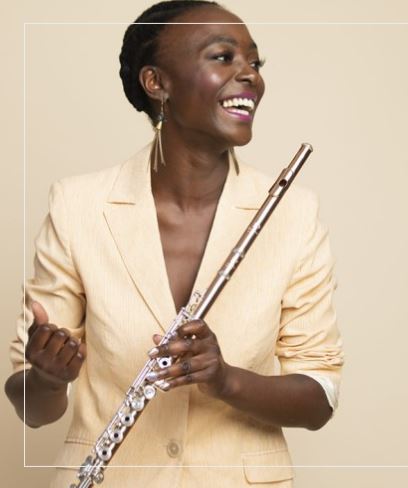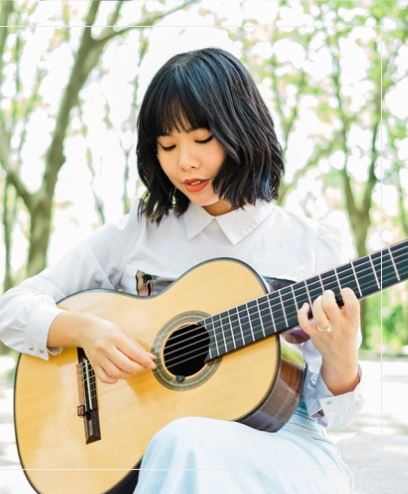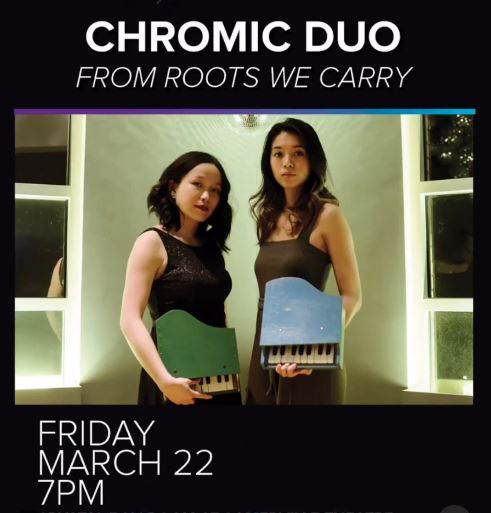LIGHTS! SOUND! MUSIC!
Now in its eighth season, Celebrity Series of Boston offered four nights of innovative music in Somerville’s Crystal Ballroom with the Stave Sessions. Each evening offered a single intermission-free ninety minute performance. The first three evenings included virtuoso real-time performances of singing, flute, guitar, and keyboards mixed with impressive light shows, electronic sound effects, and sampling. All three offered more than music. The four performers (two soloists and a duet) invited and challenged audience members to dig deep into their own psyches and values as they experienced what each performer had to offer.
The series began on Wednesday March 20 with an opportunity to hear a live performance of flutist, vocalist, and composer Natalie Joachim’s recently released Ki moun ou ye (Nonesuch and New Amsterdam Records). Dressed in a floor-length ivory gown splashed with teal green and mauve, the Haitian-American GRAMMY-nominee began her song cycle “Ki moun ou ye” (“Who are you?”) with a reminiscence of her grandmother, whom she described as the first person to see her fully. Her beautiful and clear soprano, punctuated by passages on the flute and supported by electronically generated beats and harmonies, carried us forward on a hypnotic journey. The question “Who are you?” she explained, can be a casual request for a name, or it can be interpreted more profoundly as an inquiry into a person’s heritage or roots, or as a question, What aspect of your personality or being do you inhabit today? “I may contain a tiny little piece of every person I encounter,” Joachim said, and added that “who are you?” is a loaded question that is well worth answering.
Joachim invited the audience to “play a game” by turning to an adjacent person and saying “I love you.” The game lay in the response — the second person was directed to say, “I love you more.” An interesting twist on one-upmanship, but I was relieved to be sitting next to someone I actually knew (and loved). Joachim’s bilingual performance included both English and Haitian Kreyol lyrics. “If language can be taken away,” she said, “it must have value and be a source of power.”
Thursday March 21 brought Korean-American guitarist JIJI to the stage to present her Unbound project. Widely known for her virtuosity on both classical and electric guitar, JIJI did not hesitate to question the very concept of virtuosity. “Virtuosity,” JIJI noted, “can mean fast arpeggios or it can mean slow and emotional.” After wowing the audience with her rendition of Niccolò Paganini’s notoriously difficult Caprice No. 24 for piano on guitar, she remarked with more than a hint of irony, “Look what I can do.”
JIJI, who has been featured on PBS and NPR, has explored the concept of virtuosity through Unbound, a project for which she commissioned virtuosic solo guitar compositions from eight composers based in Australia, Brazil, Iceland, Latvia, and the United States. In a loose-fitting pants outfit that shimmered in the constantly changing stage lights, she performed these pieces, beginning with acoustic guitar and in the course of the performance switching to electric guitar and increasing the amount of electronic sound that accompanied her fingerwork. The set culminated with Icelandic composer Gulli Bjornson’s dramatic “Dimmar Öldur RÃsa” (Dim Waves Rise) which appropriately achieved a crescendo of heart-stopping electronic and sampled sound.
On Friday, March 22, Chromic Duo (Lucy Yao and Dorothy Chan) brought their array of keyboards to the stage for From Roots We Carry. Yao on a conventional upright piano provided the main melodic content of the work; Chan danced her way among a variety of instruments’”electronic keyboard, toy pianos and toy xylophone, laptops presumably cued to render sound effects. Spangled and sequined jackets shot sometimes briefly blinding sparks across the room in response to ever-moving lights.
The grand prize-winning duo (Young Classical Artists Trust and Concert Artists Guild) describe their concerts as “genre-fluid.” The Friday performance included selections from Oscar-winning Japanese composer Ryuichi Sakamoto and Maurice Ravel’s “Pavane for a Dead Princess,” as well as from up-and-coming composers Samn Johnson (“Yeartide”) and Yasmin Williams (“Urban Driftwood.”)
A series of prose poems from a variety of recorded voices offered moving and intriguing reflections on the experiences of Asian immigrants and their descendants. The performance ended with an invitation to audience members to go to their phones to accept an invitation to participate by typing an answer to the question What elements do you dream of bringing into our collective present? Answers were projected anonymously onto the large screen behind the stage, and included terms such as Friendship and Shimmering.
These three performances provided a lot and at the same time demanded a lot of their audience. We were asked not only to consider numerous questions, but also to think about the meaning of the questions. (Who are you? What is virtuosity? What are your roots? What do you wish to bring into our collective lives?) These are all good questions and important questions, and yet, it is worth remembering at times when one is surrounded by beautiful voices and layers of sound, by a swirl of light and a shimmer of color, that sometimes it makes sense not to think or seek the answers to questions, but to simply listen.
Listen, and let the answers appear.
The Stave Sessions will end on Saturday March 23 with the Mark Lettieri Group. The five-time Grammy award winning guitarist and composer Mark Lettieri will perform in a range of popular music genres with Wes Stephenson (bass), Jason Thomas (drums), and Daniel Porter (keys).







